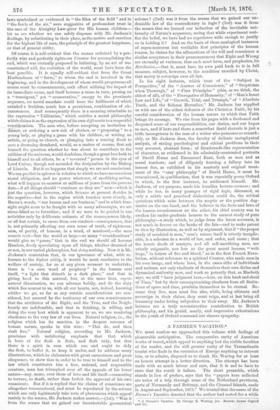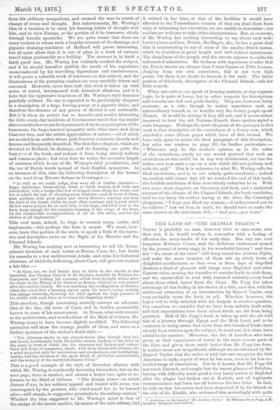A FARMER'S VACATION.*
WE must confess we approached this volume with feelings of pleasurable anticipation. The comparative rarity of American works of travel,.which appeal to anything but the risible faculties of the reader, and the still greater rarity of the Transatlantic tourist who finds in the countries of Europe anything to interest him, or to admire, disposed us to thank Mr. Waring for at least an honest attempt in a better direction. The attempt has been made with so much labour and care, that it is sad to have to state that the result is failure. The short preamble, which stands in lieu of preface, says that the "papers here collected arc notes of a trip through some of the Netherland provinces, parts of Normandy and Brittany, and the Channel Islands, made in August and September, 1873." We trusted that the name of the Farmer's Vacation denoted that the author had rested for a while
A Farmer's Vacation. By George E. Waring, jun. Boston: James Osgood and Co.
from his ordinary occupations, and crossed the seas in search of change of scene and thought. But unfortunately, Mr. Waring's idea of a vacation is to carry his farming habits of thought with him, and to view Europe, or the portion of it he traverses, chiefly through bucolic spectacles. We are quite aware that there are many readers to whom such a lengthy account of the drainage and gigantic draining-machines of Holland will prove interesting, but all must allow that it is out of place in a book of autumn travel taken professedly as a holiday. The account is in itself a fairly goodone. Mr. Waring has evidently studied the subject, and if he should hereafter publish the result of his experience unencumbered by his travelling digressions and reminiscences.
it will prove a valuable work of reference on this subject, and the illustrations of the pumping-engines are very carefully drawn and executed. However, more than half this work is taken up with motes of travel, interspersed with historical allusions, and it is here that the oppressive heaviness of Mr. Waring's style becomes painfully evident. No one is expected to be particularly eloquent in a description of a large forcing-pump or a gigantic sluice, and therefore the absence of any graces of diction is not noticeable. But it is when an author has to describe and render interesting the little every-day incidents of Continental travel that. the reader discovers whether or not he is possessed of the keen perception of the humorous, the large-hearted sympathy with other races and ideas than our own, and the subtle appreciation of nature,—all of which are needed in an author whose path lies over a country already well known and frequently described. The first three chapters, which are
devoted to Holland, its drainage, and its farming, are quite the bests.---..t of the book, and redeem it from being utterly tedious
and common-place ; but even here we notice the excessive length of sentence which is one of Mr. Waring's chief peculiarities, and the use of Dutch words instead of their English synonyms. As an instance of this, take the following description of the houses on the road from Nieuwe Schans to Groningen :—
"As well as we could judge, they were all of similar character— large, handsome, three-storey, stone or brick houses, well built and substantial, with a hedge-like row of clipped trees along the front—cut low to admit the sun to sleeping-room windows—and in front of these, neat gardens, with good grass and showy flowers; running out from the back of the house, which its peak often overtops, and beyond which its low eaves project far on each side, is the huge, red-tiled roof of the barn, large enough for the complete housing of the crops of the farm, for the comfortable accommodation of all its live stock, and for the shelter of all implements."
This roof must, indeed, be huge to contain crops, cattle, and implements,—but perhaps the barn is meant. We must, how- ever, leave this portion of the work, to speak a little of the narra- tive and descriptive notes on the Bight of La Manche and the Channel Islands.
Mr. Waring has nothing new or interesting to tell his Trans- atlantic brethren of such towns as Rouen, Caen, &c., but limits his remarks to a few architectural details, and some few historical allusions, of which the following, about Caen, will give our readers a fair idea :—
"At Caen, too, we had barely time to drive to the citadel, to the beautiful, fine Norman Church of St. Stephen, founded by William the Conqueror. and holding his remains, which were brought hither after his death in the Priory of St. Gervais at Rouen, whither ho was carried after his curious injury. He was watching the conflagration of Mantes, when the wind blew a burning ember upon his horse's croup, making him plunge violently, throwing his rider against the high pommel of his saddle with such force as to cause his liagering death.'
This anecdote, though interesting, scarcely conveys an adequate idea of the fine, old town of Caen, and is, besides, presumably known to some of his countrymen. At Rouen, what with wonder at the architecture, and recollections of the Maid of Orleans, Mr.
Waring seems to have become slightly muddled. The following quotation will show the strange jumble of ideas, and serve as a further specimen of the author's florid style :—
" Ten chimney-stacks to one church-tower (fine though they be), and broad, handsomely-built, Paris-like streets, leading to the hotel on the quay, in front of which are the steamers and barges, and cotton- bales and drays of commerce, shock, with their nineteenth-century air, a mind prepared only for narrowness and crookedness, and butting top- stories, and the richness of the most florid of all Gothic architecture, and the memory of the martyred Jeanne d'Are."
This is a good example of the style of historical allusion with which Mr. Waring is continually favouring his readers, but on the next page, there is another, and almost a better one, again in re- ference to the Maid of Orleans. "The donjon tower—in which Jeanne d'Arc, in her military apparel and loaded with irons, was interrogated by the prelates, who condemned her to be burned alive—still stands, in suggestive proximity to the railway-station."
Whether the idea suggested to Mr. Waring's mind is that of the escape of the heroic maiden, by means of the said railway, had
it existed in her time, or that of the facilities it would have afforded to the Transatlantic tourists of that era (had there been any) of witnessing her execution, we are unable to determine ; our readers are welcome to take either interpretation. But, en revanche, if Mr. Waring has nothing interesting to say about such well- known places as Caen, Rouen, the Hague, &c., he has a great deal that is uninteresting to say of some of the smaller Dutch towns, which he describes at great length and with tedious minuteness. The cleanliness of the people and the streets appears to excite his unbounded admiration. He declares with ingenuous wonder that the Dutch streets are cleaner than Union Square or Fifth Avenue. Judging from our own experience, this is not very high praise, but there is no doubt he intends it for such. The latter portion of this book, descriptive of the Channel Islands, calls for little remark.
When our author can speak of farming matters, or any cognate topic, be is quite at home, but in other respects his descriptions and remarks are dull and guide-booky. They are, however, fairly accurate, as a rule, though be makes sometimes such an extraordinary remark as to wonder why the Jersey people speak' French. It would be strange if they did not, and it seems rather incorrect to hear the old Norman-French there spoken styled a rude language. Perhaps the most eloquent of the passages in this work is that descriptive of the escutcheon of a Jersey cow, which concludes some fifteen pages which treat of this animaL We have only space to notice the final paragraph of this description, but refer our readers to page 205 for further particulars :— "Whatever may be the reader's opinion as to the value of the escutcheon, surely no one would pretend that such an escutcheon as this could be in any way detrimental, nor has the writer ever seen such a one on a cow which did not perform well with the pail." This is in reference to what Mr. Waring calls the ideal escutcheon, and is, to our minds, quite conclusive ; indeed we confess with shame that till we reached the end of this book, the heraldic attributes of kine were utterly unknown to us. With two more short chapters on Guernsey and Sark, and a statistical account of the climate of the Channel Islands, the book concludes, and we can fancy the author saying at the close, like Canning's clergyman, "I hope you liked my sermon,—I endeavoured not to be tedious ;" but we fear, in truth, we should have to make the same answer as the statesman did,—"And yet,—you were."



































 Previous page
Previous page